Darjeeling Hills University (DHU) was established in 2021 vide The Green Field University Act, 2018, of the Govt of West Bengal. Originally named as ‘Green Field’ University, it was only after the local Gorkhas strongly demanded the University be re-named as Gorkhaland University that Government of West Bengal eventually re-named it as Darjeeling Hills University.

We have Bodoland University in Bodoland, Assam. Mamata Banerjee could have allowed DHU to be named as Gorkhaland University (GU) as a goodwill gesture, but she and her entire power corridors in Kolkata de-taste the very word ‘Gorkha or Gorkhaland’. Few years ago, I came across a momo shop called ‘Tibetan corner’ operated by a Gorkha person from Kalimpong in Tollygunj area (name changed), Kolkata. While having momo, I informally advised him to rename the shop as ‘Gorkha Corner’ as it would sound more relevant. He was scared and turned uncomfortable as many locals were also eating. He mildly told me, “daju, I feel insecure as a Gorkha, hence I identify myself as Tibetan here. It’s a business and survival strategy for me”. Constitutionally, Kolkata is equally ours as they feel Darjeeling hills is theirs.
Why are we obsessed with such ludicrous names like ‘Green Field’ for Universities? They are sacred and valuable spaces often with historic vision and missions. We also have an airport called Greenfield Airport at Pakyong, Sikkim. In Sikkim we have Universities with names like Capital, Medhavi, Alpine, Skill, Professional etc. Such names demean the very idea of a University and often give us the impression of two-rooms computer diploma centres of the mid-1990s in Darjeeling like APTEC, NIIT etc. We have so many luminaries and historical figures in the region, why can’t we have these universities in their names? This diploma-centre mentality of our policy makers also in one way or the other reflects their understanding and respect for higher education institutions. They should take out their time to tour and walk through the campuses of the Universities like JNU or BHU to internalise the very idea and concept of a University. The ‘diploma-centre mentality’ will only harm higher education system in the region.
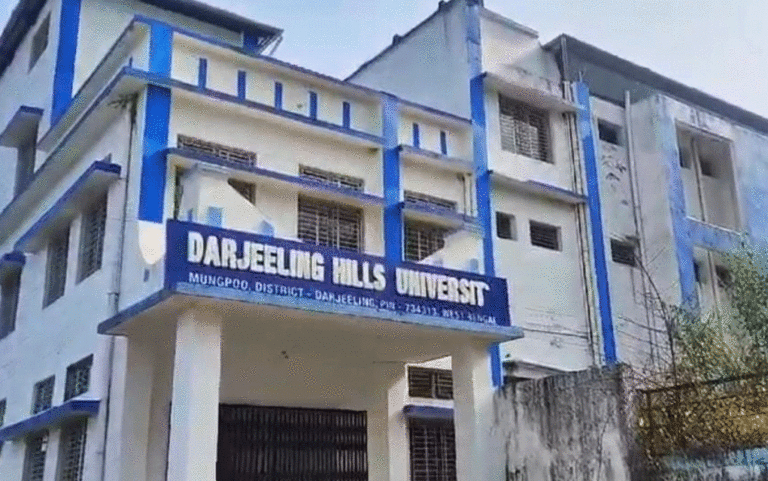
Coming back to DHU, it carries the weight of expectation – to cater to the long-felt need for accessible and quality academic opportunities in a unique geographical and cultural landscape of Darjeeling hills and its surrounding. Students from the region often have to migrate to pursue higher education, facing geographical and financial hurdles. DHU’s establishment actually aims to bridge this gap by providing local youth with access to quality education closer to home. The university’s motto, ‘excellence. inclusion. innovation,’ reflects its commitment to academic rigor, catering to diverse student backgrounds, and fostering a culture of ground breaking research. Sounds good on paper! The reality is, however, quite different.
DHU, since it was established in 2021, has been functioning with the help of University of North Bengal and its affiliated colleges. To be blunt, part-timers are running the academic and administrative affairs of Darjeeling Hills University for the last three and half years.
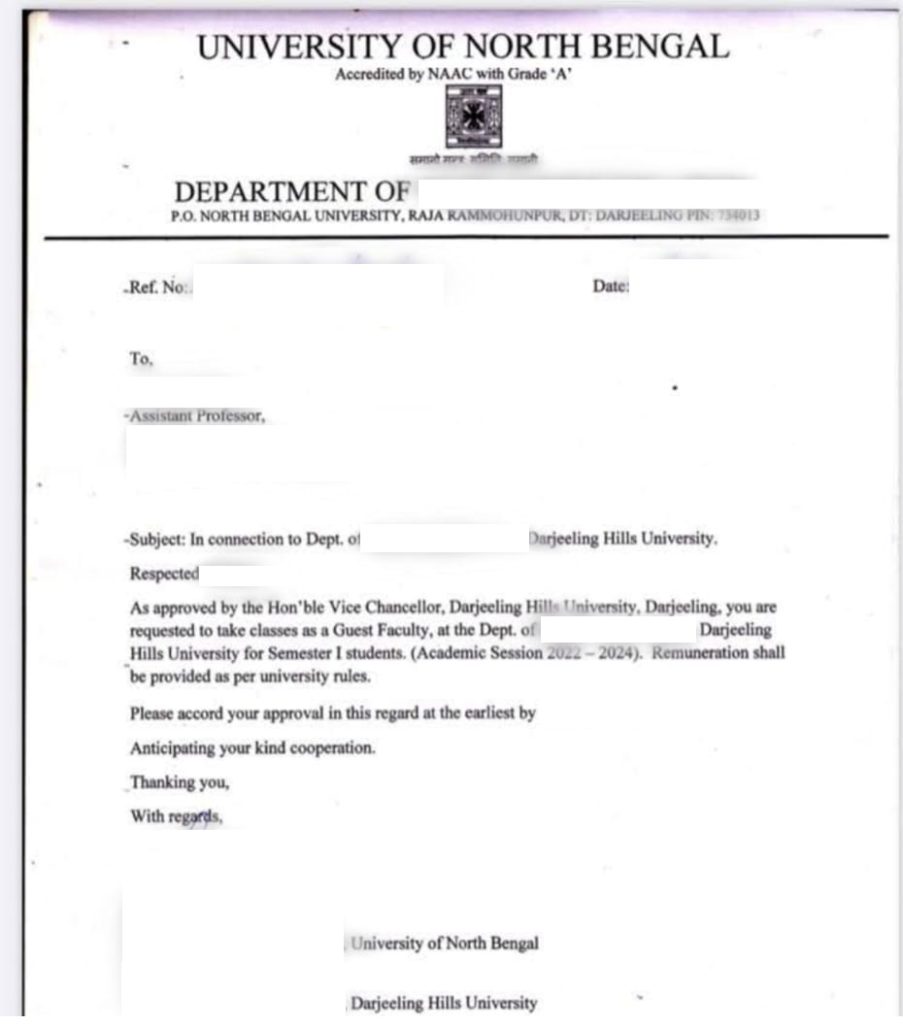
The project of DHU has made mockery of the Gorkhas and higher education in the region. The PG-courses floated by DHU had been operating through online mode since their start till about few days ago, thanks to COVID19! It was only on April 09, 2024, DHU, reportedly, started its offline classes.
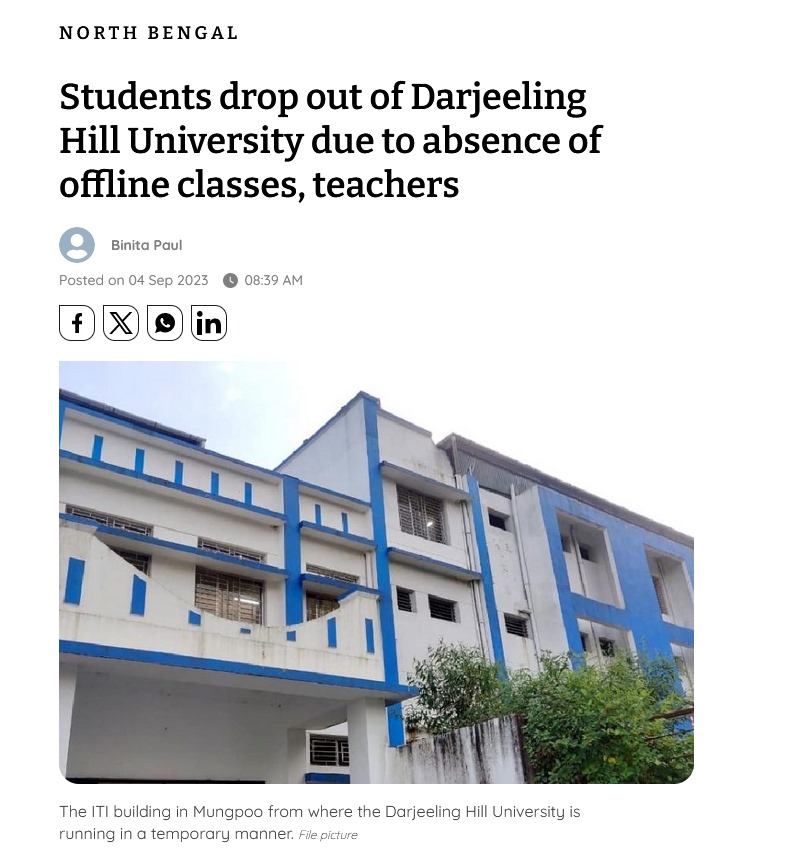
Not a single regular staff has been appointed by the Government of West Bengal so far! It has been functioning under the mercy of NBU and college teachers in and around the region. Why is there no full-time VC, Registrar, Finance Officer, Controller of Examinations, Librarians and faculty members in the university even after three years of its establishments. Why is the Gorkhaland Territorial Administration, the custodian of well-being of Darjeeling hills, not pushing and putting pressure on the state government?
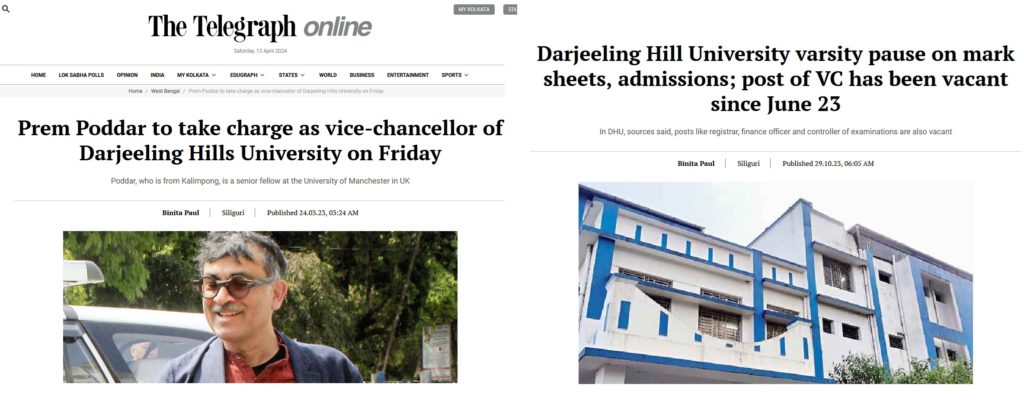
It’s sad that college teachers /staff members are now given additional charges to run the Darjeeling Hills University. University is not a college, it’s a different ecosystem.
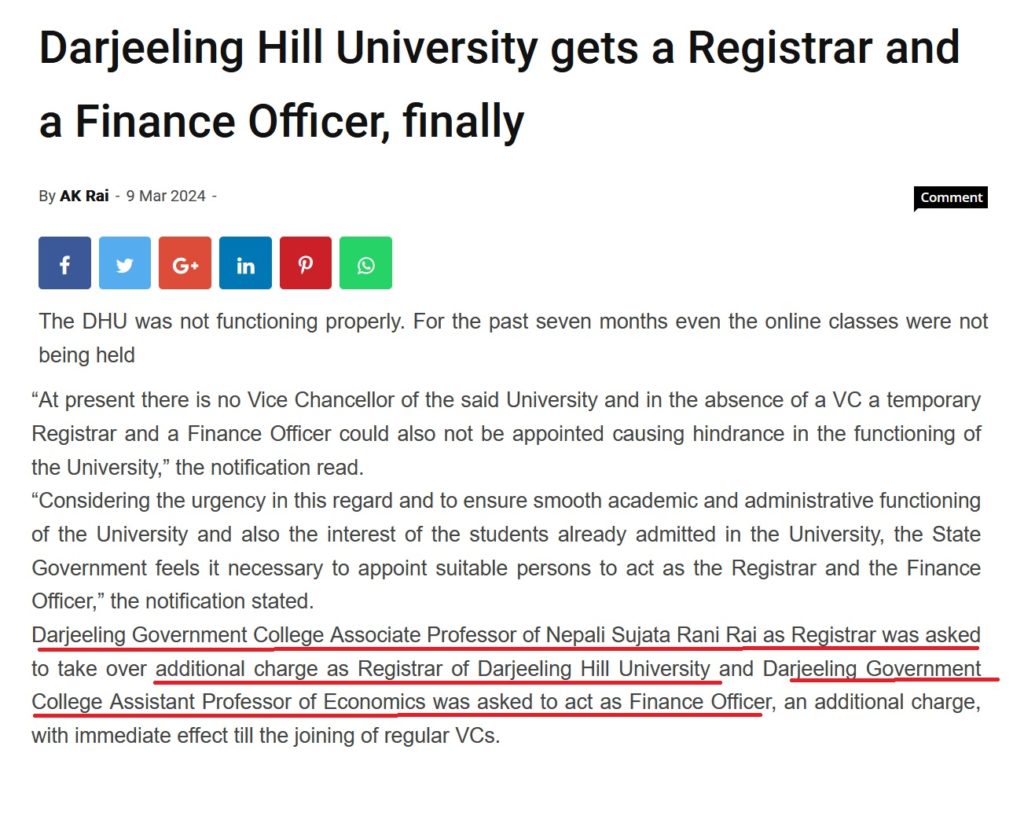
It has bigger and far reaching objectives, missions and vision. Higher education in Darjeeling hills cannot be taken so lightly. Hill students cannot be taken on ride in this way! In Sikkim also they take higher education or education as a whole very lightly. In the state university of Sikkim, school teachers were deputed to teach MA courses few years ago. An Assistant Professor of a college was made registrar, controller etc. These are statutory positions equivalent to the post of secretary of a state. It requires decades of academic/administrative experiences to take up the responsibilities of these positions. It’s also important to understand that having NET/SLET does not mean we can bypass procedures to be appointed in a University. There are rules, regulations and protocols to be followed. But babus up-there just do not bother. Their objective is just to grab power with little concern on the quality higher education. A simple question to the bureaucrats: Can an under-secretary be made chief secretary or even a secretary by-passing over a decade of experience?
It is sad and frustrating to record here that public at-large also show little or no concern on the state of higher education in the region while institutions like Gorkhaland Territorial Administration (GTA) is busy on construction and mining projects. It’s high time DHU becomes a full-fledged functional University with its own staff-members, teachers, campus and infrastructure. Public should rise in unity to make it fully functional. We need to take help of judiciary if things do not move.
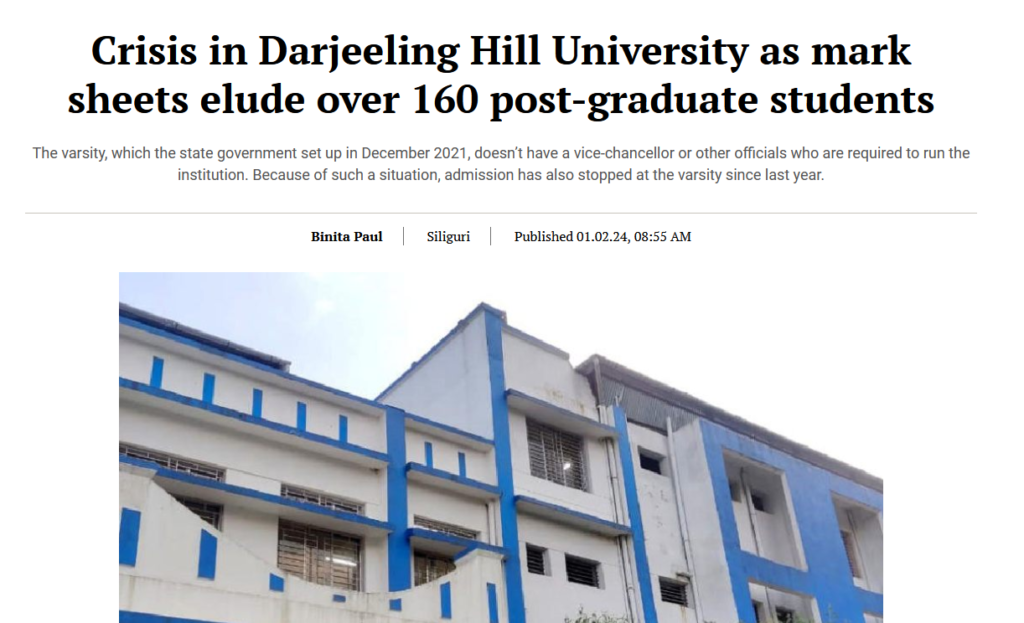

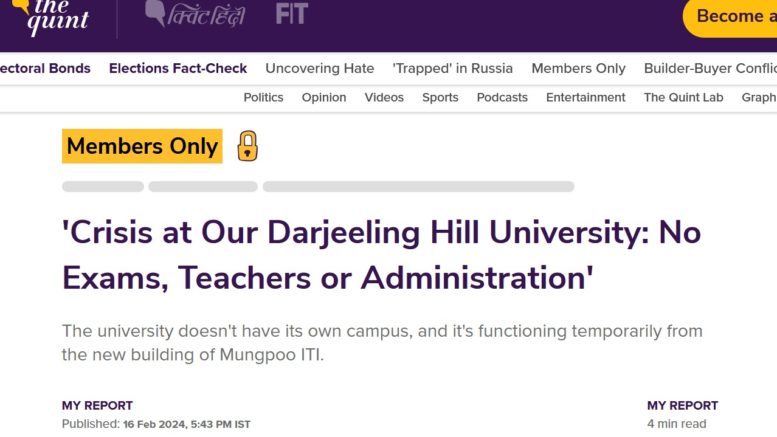


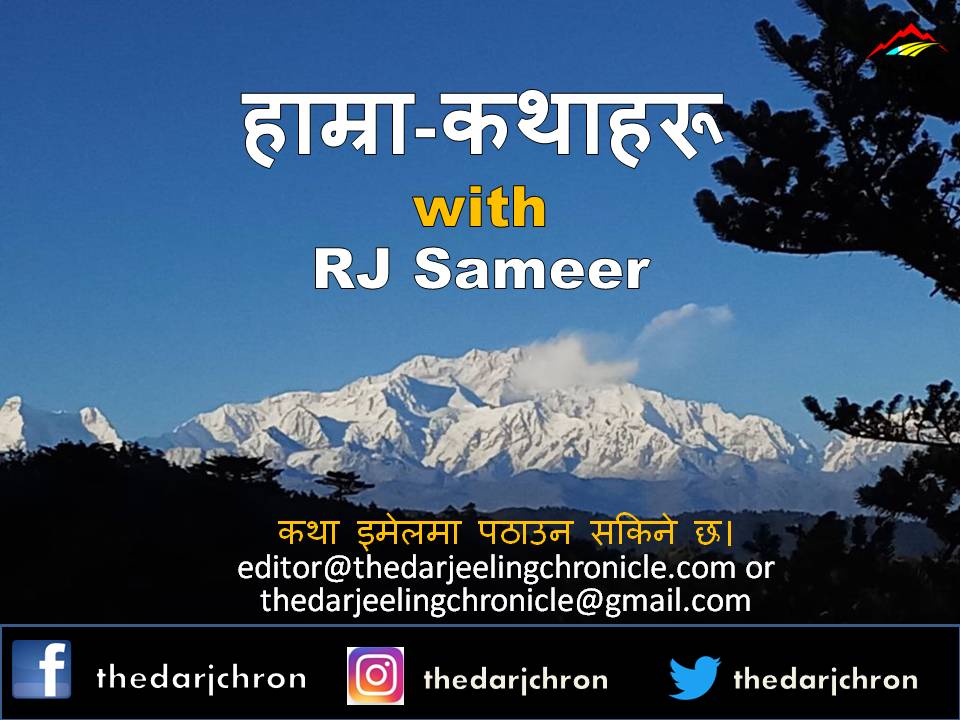

Leave a comment